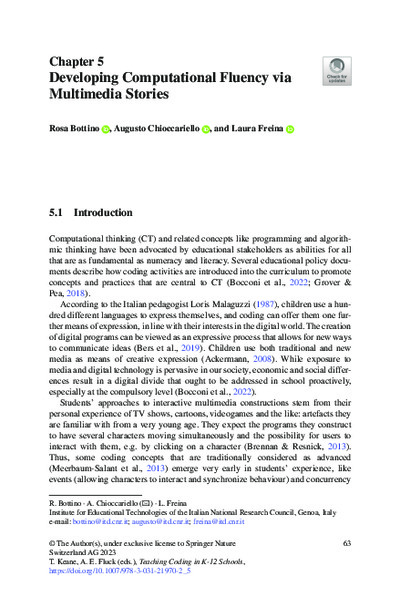Developing Computational Fluency via Multimedia StoriesRosa Bottino, Augusto Chioccariello, Laura Freina
|
 |
 Diese Seite wurde seit 2 Jahren inhaltlich nicht mehr aktualisiert.
Unter Umständen ist sie nicht mehr aktuell.
Diese Seite wurde seit 2 Jahren inhaltlich nicht mehr aktualisiert.
Unter Umständen ist sie nicht mehr aktuell.
 Zusammenfassungen
Zusammenfassungen
 According to the Italian pedagogist Loris Malaguzzi, children use a hundred different languages to express themselves. In order to be literate in today’s digital world, one further language is needed: programming. The creative construction of multimedia stories offers children and teachers alike a rich context for the introduction of computing education in primary school. Children are eager consumers and producers of stories, and a multimedia programming environment enables them to ‘write’ by assembling images, sounds and texts and share their creation with others. From a pedagogical point of view, storytelling is a familiar activity for primary children and teachers; a suitable programming environment can help them extend this to the creation of digital stories. Fluency in any language not only entails the ability to produce and read the language, but also to understand the underlying linguistic structures used to create a story. This chapter describes a story-based approach to learning a programming language, focusing on the ability to understand and reuse existing computer code. The aim of the approach is to develop computational fluency in children and teachers, and in this regard specific reference is made to field work carried out in an Italian primary school.
According to the Italian pedagogist Loris Malaguzzi, children use a hundred different languages to express themselves. In order to be literate in today’s digital world, one further language is needed: programming. The creative construction of multimedia stories offers children and teachers alike a rich context for the introduction of computing education in primary school. Children are eager consumers and producers of stories, and a multimedia programming environment enables them to ‘write’ by assembling images, sounds and texts and share their creation with others. From a pedagogical point of view, storytelling is a familiar activity for primary children and teachers; a suitable programming environment can help them extend this to the creation of digital stories. Fluency in any language not only entails the ability to produce and read the language, but also to understand the underlying linguistic structures used to create a story. This chapter describes a story-based approach to learning a programming language, focusing on the ability to understand and reuse existing computer code. The aim of the approach is to develop computational fluency in children and teachers, and in this regard specific reference is made to field work carried out in an Italian primary school. Dieses Kapitel erwähnt ...
Dieses Kapitel erwähnt ...
 Personen KB IB clear | Efthimia Aivaloglou , Michal Armoni , Christan Balch , Mordechai Ben-Ari , Marina Umaschi Bers , Rosa Bottino , Karen Brennan , Augusto Chioccariello , Michelle Chung , Laura Freina , Felienne Hermans , Margaret Honey , David Kanter , Orni Meerbaum-Salant , Sabrina Panesi , Seymour Papert , Mitchel Resnick , Brian Silverman | |||||||||||||||||||||||||||||||||||||||||||||||||||||||||||||||||||||||||||||||||
 Begriffe KB IB clear | Bildungeducation (Bildung)
,  Computer Computer computer
, computer
,  Digitalisierung
, Digitalisierung
,  LehrerIn LehrerIn teacher
, teacher
,  Lernen Lernen learning
, learning
,  Multimedia Multimedia multimedia
, multimedia
,  Primarschule (1-6) / Grundschule (1-4) Primarschule (1-6) / Grundschule (1-4) primary school
, primary school
,  Programmieren Programmieren programming
, Programmieren für KinderProgramming for kids
, programming
, Programmieren für KinderProgramming for kids
,  Schule Schule school
, storytellingstorytelling school
, storytellingstorytelling
| |||||||||||||||||||||||||||||||||||||||||||||||||||||||||||||||||||||||||||||||||
 Bücher |
| |||||||||||||||||||||||||||||||||||||||||||||||||||||||||||||||||||||||||||||||||
 Texte |
|
 Dieses Kapitel erwähnt vermutlich nicht ...
Dieses Kapitel erwähnt vermutlich nicht ... 
 Nicht erwähnte Begriffe | Eltern, Internet, Kinder, Schweiz, Unterricht |
 Tagcloud
Tagcloud
 Zitationsgraph
Zitationsgraph
 Zitationsgraph (Beta-Test mit vis.js)
Zitationsgraph (Beta-Test mit vis.js)
 Zeitleiste
Zeitleiste
 Anderswo finden
Anderswo finden
 Volltext dieses Dokuments
Volltext dieses Dokuments
 |  Developing Computational Fluency via Multimedia Stories: Artikel als Volltext @ Springer ( Developing Computational Fluency via Multimedia Stories: Artikel als Volltext @ Springer ( : :  , 862 kByte; , 862 kByte;  : :  ) ) |
 Anderswo suchen
Anderswo suchen 
 Beat und dieses Kapitel
Beat und dieses Kapitel
Beat hat Dieses Kapitel während seiner Zeit am Institut für Medien und Schule (IMS) ins Biblionetz aufgenommen. Er hat Dieses Kapitel einmalig erfasst und bisher nicht mehr bearbeitet. Beat besitzt kein physisches, aber ein digitales Exemplar. Eine digitale Version ist auf dem Internet verfügbar (s.o.). Es gibt bisher nur wenige Objekte im Biblionetz, die dieses Werk zitieren.



















 Biblionetz-History
Biblionetz-History